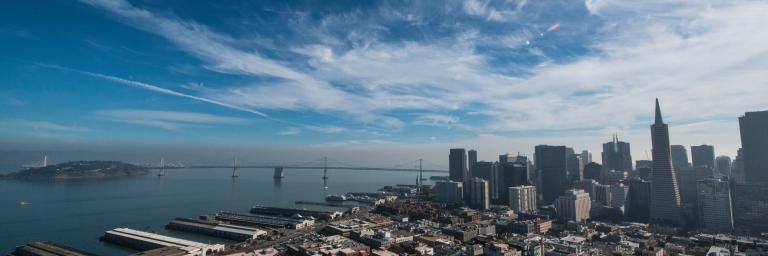It is the vision of the Sustainability and Climate Action Program at SFMTA to ensure that the work of the agency helps to improve the quality of life and the environment in San Francisco and the region. The SFMTA is already blazing the trail in the reduction of transportation-related greenhouse gas emissions (CO2e). In conjunction with our city partners, we are committed to continuing to implement critical programs that will enable the city to reach its environmental goals and further reduce emissions, resource consumption and identify greener choices for private vehicles.
The Sustainability and Climate Action Program is guided by a comprehensive network of agency and citywide plans, policies and initiatives. These plans, policies and initiatives establish a strong foundation for a dynamic array of near-term mitigation and adaptation actions and longer-term resiliency efforts to address California’s perennial drought risk, rising sea levels, and other climate change conditions.
Transit First San Francisco adopted its Transit First Policy in 1973 to provide a strong policy foundation for investments in its transit system and the multimodal transportation system. The SFMTA transit system and the bicycle and pedestrian network plays an important role in the local and regional economy by reducing traffic congestion, reducing commute times and energy consumption, and facilitating walking and bicycling trips which collectively reduce greenhouse gas emissions. San Francisco has led the region and state in transit ridership growth with twenty five percent of trips in 2017 made using transit. The city’s transit mode share has allowed San Francisco’s economic and population growth to significantly outpace increases in transportation sector emissions.
Strategic Plan The Fiscal Year 2021-2024 Strategic Plan establishes the vision, values and metrics, and strategic goals to create a city of diverse and vibrant neighborhoods seamlessly connected by safe, reliable, affordable transportation for all. The vision includes a transportation system that combats climate change, mitigates pollution and CO2 emissions from transportation and supports the resiliency and adaptation of the city's infrastructure. This is followed by a goal to eliminate pollution and greenhouse gas emissions by increasing use of transit, walking and bicycling.
2023 Climate Roadmap to a Healthier City In December 2021, the San Francisco Department of the Environment released the 2021 San Francisco Climate Action Plan which lays out a multisector plan for addressing climate change in San Francisco. To align with that plan and urgently advance priority actions, the SFMTA is aiming to develop a transportation-specific climate action plan with a shorter time horizon (5-7 years) that will establish the priority actions the agency must pursue beyond what it is already doing in order to reach citywide climate goals and support co-benefits like health, air quality, mobility, and social equity.
2021 San Francisco Climate Action Plan lays out a climate action framework across six sectors, including the transportation and land use sector. By the year 2030, at least 80% of all San Francisco trips are low-carbon trips—trips by transit, walking or biking. By 2030, 25% of private vehicles are EVs, and, by 2040, 100% of private vehicles are EVs. By 2040, the city has net zero greenhouse gas emissions.
